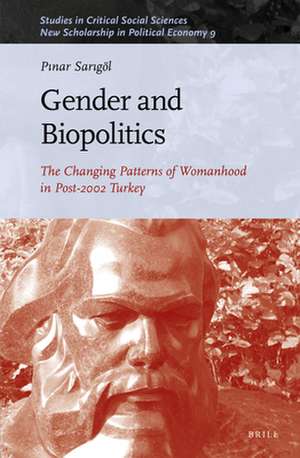Gender and Biopolitics: The Changing Patterns of Womanhood in Post-2002 Turkey: Studies in Critical Social Sciences / New Scholarship in Political Economy, cartea 194/09
Autor Pınar Sarıgölen Limba Engleză Hardback – 20 oct 2021
Din seria Studies in Critical Social Sciences / New Scholarship in Political Economy
- 18%
 Preț: 676.67 lei
Preț: 676.67 lei - 18%
 Preț: 635.93 lei
Preț: 635.93 lei - 18%
 Preț: 986.16 lei
Preț: 986.16 lei - 18%
 Preț: 936.72 lei
Preț: 936.72 lei - 18%
 Preț: 902.74 lei
Preț: 902.74 lei - 18%
 Preț: 1198.74 lei
Preț: 1198.74 lei - 18%
 Preț: 996.04 lei
Preț: 996.04 lei - 18%
 Preț: 961.43 lei
Preț: 961.43 lei - 18%
 Preț: 853.70 lei
Preț: 853.70 lei - 18%
 Preț: 827.96 lei
Preț: 827.96 lei - 18%
 Preț: 1154.24 lei
Preț: 1154.24 lei - 18%
 Preț: 842.78 lei
Preț: 842.78 lei - 18%
 Preț: 823.01 lei
Preț: 823.01 lei - 18%
 Preț: 867.51 lei
Preț: 867.51 lei - 18%
 Preț: 793.35 lei
Preț: 793.35 lei - 18%
 Preț: 748.85 lei
Preț: 748.85 lei - 18%
 Preț: 630.20 lei
Preț: 630.20 lei - 18%
 Preț: 684.59 lei
Preț: 684.59 lei - 18%
 Preț: 635.15 lei
Preț: 635.15 lei - 18%
 Preț: 635.15 lei
Preț: 635.15 lei - 18%
 Preț: 681.33 lei
Preț: 681.33 lei - 18%
 Preț: 808.19 lei
Preț: 808.19 lei - 18%
 Preț: 823.01 lei
Preț: 823.01 lei - 18%
 Preț: 826.88 lei
Preț: 826.88 lei - 18%
 Preț: 738.96 lei
Preț: 738.96 lei - 18%
 Preț: 664.81 lei
Preț: 664.81 lei
Preț: 808.19 lei
Preț vechi: 985.59 lei
-18% Nou
Puncte Express: 1212
Preț estimativ în valută:
154.64€ • 162.04$ • 127.84£
154.64€ • 162.04$ • 127.84£
Carte indisponibilă temporar
Doresc să fiu notificat când acest titlu va fi disponibil:
Se trimite...
Preluare comenzi: 021 569.72.76
Specificații
ISBN-13: 9789004337398
ISBN-10: 9004337393
Dimensiuni: 155 x 235 mm
Greutate: 0 kg
Editura: Brill
Colecția Brill
Seria Studies in Critical Social Sciences / New Scholarship in Political Economy
ISBN-10: 9004337393
Dimensiuni: 155 x 235 mm
Greutate: 0 kg
Editura: Brill
Colecția Brill
Seria Studies in Critical Social Sciences / New Scholarship in Political Economy
Cuprins
Acknowledgements
Abbreviations
1 Introduction
The Conceptualisation of Ideal Womanhood in Post-2002 Turkey
1 The Conceptualisation of Problematic Womanhood and Governmentality
2 Changing Patterns of Womanhood in Post-2002 Turkey
3 Insights from Foucault’s Method
4 Selection of the Research Sources
5 Structure of the Book
6 Concluding Remarks
2 The Closed Circuits of the Woman’s Sexuality and Temperate Seductiveness
1 Islamic Virtues on Woman’s Sexuality
2 The Imagined Population in the New Gender Regime
2.1Islamic Heteronormativity and Its Performances
2.2Contouring Gender Justice
3 Intimacy in Public or the Intimacy of the Public?
3.1To Veil or Not to Veil
3.2On the Political Representations of Women
3.3Policing Public Morality
4 Concluding Remarks
3The Sacred Family Portrait
Balance, Uniformity, Patience and Piety
1 Understanding the Family in Its Cooperative Manner
2 True Womanhood and Unmanageable Fields of Government
2.1The New Definition of Womanhood
2.2Awakening the Sense of Motherhood
2.3Some Facts: Adultery, Homosexuality, Prostitution, Brothels and the Like
3 The Last Sight on Family
3.1Consulting Services for the Betterisation of Family
3.2Divorce as an Impossible Practice
4 Concluding Remarks
4 Reconsidering Violence as a Disciplinary and Regulatory Apparatus
1 Statistical Facts and the Hard Truth
2 Rape as a Justified Reaction against the Impropriety
3 From Crimes of Honour to Crimes of Passion
4 Political Reality and the Depoliticisation of Violence
4.1Protective Mechanisms and Legal Applications
4.2Manhood and Violence
4.3Gendered Mediation
5 Concluding Remarks
5 Islamic Neoliberal Female Subjectivity in Post-2002 Turkey
1 Reading Political Islamism in Its Own Governmental Nature in Turkey
2 Islamic Neoliberal Governmentality: Challenging the Unity of Sovereign Power, Disciplinary Power and Biopower
3 Rethinking Gender Justice in the Context of Islamism and Neoliberalism
4 The Exclusion and Inclusion of Women at the Intersection of Differences
5 Concluding Remarks
6 Conclusions
Resistance for the Better
References
Index
Abbreviations
1 Introduction
The Conceptualisation of Ideal Womanhood in Post-2002 Turkey
1 The Conceptualisation of Problematic Womanhood and Governmentality
2 Changing Patterns of Womanhood in Post-2002 Turkey
3 Insights from Foucault’s Method
4 Selection of the Research Sources
5 Structure of the Book
6 Concluding Remarks
2 The Closed Circuits of the Woman’s Sexuality and Temperate Seductiveness
1 Islamic Virtues on Woman’s Sexuality
2 The Imagined Population in the New Gender Regime
2.1Islamic Heteronormativity and Its Performances
2.2Contouring Gender Justice
3 Intimacy in Public or the Intimacy of the Public?
3.1To Veil or Not to Veil
3.2On the Political Representations of Women
3.3Policing Public Morality
4 Concluding Remarks
3The Sacred Family Portrait
Balance, Uniformity, Patience and Piety
1 Understanding the Family in Its Cooperative Manner
2 True Womanhood and Unmanageable Fields of Government
2.1The New Definition of Womanhood
2.2Awakening the Sense of Motherhood
2.3Some Facts: Adultery, Homosexuality, Prostitution, Brothels and the Like
3 The Last Sight on Family
3.1Consulting Services for the Betterisation of Family
3.2Divorce as an Impossible Practice
4 Concluding Remarks
4 Reconsidering Violence as a Disciplinary and Regulatory Apparatus
1 Statistical Facts and the Hard Truth
2 Rape as a Justified Reaction against the Impropriety
3 From Crimes of Honour to Crimes of Passion
4 Political Reality and the Depoliticisation of Violence
4.1Protective Mechanisms and Legal Applications
4.2Manhood and Violence
4.3Gendered Mediation
5 Concluding Remarks
5 Islamic Neoliberal Female Subjectivity in Post-2002 Turkey
1 Reading Political Islamism in Its Own Governmental Nature in Turkey
2 Islamic Neoliberal Governmentality: Challenging the Unity of Sovereign Power, Disciplinary Power and Biopower
3 Rethinking Gender Justice in the Context of Islamism and Neoliberalism
4 The Exclusion and Inclusion of Women at the Intersection of Differences
5 Concluding Remarks
6 Conclusions
Resistance for the Better
References
Index
Notă biografică
Pınar Sarıgöl, Ph.D. (2020), Bielefeld University, is a lecturer teaching politics. She has published monographs and articles on contemporary Turkish politics, and on theory of gender politics and new racism.
